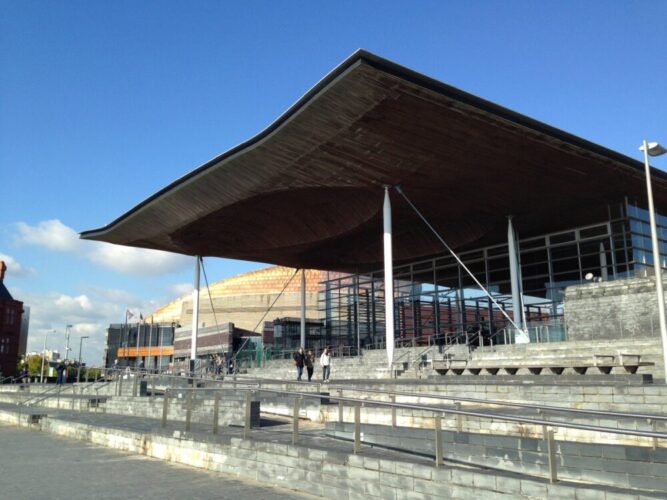Vaughan Gething described replacement EU funding streams as an “incoherent mess, with very little planning, consultation or economic logic”.
Mr Gething accused the UK Government of taking money and powers away from Wales, arguing piecemeal projects will have significantly less economic impact than EU funding.
“Wales has less say over less money,” he said. “That is a deliberate Tory choice – to centralise plainly devolved funds and responsibilities.”
The would-be first minister said the levelling-up fund has been plagued by chaos and delay, with councils pitted against each other and Wales left almost £1.3bn worse off.
He quoted the Institute for Government as saying the fund is an “ineffective competitive funding pot that is neither large enough nor targeted enough to make a dent”.
Mr Gething told the Senedd: “The delivery of the levelling-up agenda is unforgivable and deeply damaging.
“With ineptitude and indifference, the UK Government has wasted the opportunity to deliver meaningful change that Wales and the rest of the UK so desperately needs.”
‘Pot shots’
Paul Davies, the Conservatives’ shadow minister, accused Mr Gething of using the debate to take political pot shots at the UK Government.
Mr Davies said: “He should be getting on with his job, rather than whipping up the issue just to show off to his party members.
“It’s hardly very statesmanlike from someone hoping to be the next first minister.”
The former Conservative group leader highlighted the Senedd economy committee’s report on post-EU regional development funding.
He said the cross-party report provides an objective, unbiased and in-depth analysis.
Mr Davies told MSs the Welsh and UK Governments both believe they should be solely responsible for the delivery of post-EU funds.
Calling for grown-up politics, he said: “I urge both governments to get on with it and work together in the interests of the people of Wales.
“I believe that both governments could and should focus less on the politics of the funding.”
‘Unjust’
Rhun ap Iorwerth described the levelling-up agenda as an example of an unfair and unjust funding system that Wales finds itself part of.
The Plaid Cymru leader told MSs that the most deprived regions received 83% of total EU funding given to Wales.
“Almost three times as much per person as better off areas of Wales – that’s what levelling up genuinely means,” he said.
“But, under the new UK shared prosperity fund, that figure falls to 73%, and what that tells me is that we’re heading in the wrong direction.”
Mr Iorwerth highlighted The Guardian’s analysis that Conservative marginal seats received one-and-a-half times the amount of funding per person than other constituencies.
“This is democratic corruption by the Conservative Party,” he said.
‘Devastating’
Mike Hedges told MSs that if the levelling-up agenda is going to work, it must increase gross value added and median salary.
The Labour MS for Swansea East said: “It’s not about doing nice things or prettying up areas, important as they are; it’s about creating more high-paid employment.”
Luke Fletcher, Plaid Cymru’s shadow economy minister, raised concerns about the “potentially devastating” impact of the loss of EU funding on apprenticeships.
He told the chamber: “It will be an impact that goes beyond just education – it will also be felt across the economy.”
Alun Davies, a Labour backbencher who represents Blaenau Gwent, argued the levelling up agenda is a public relations exercise rather than a serious economic policy.
“It was only ever about photo opportunities and pork barrel politics,” he said.
Jane Dodds, leader of the Lib Dems in Wales, argued that local democracy is eroded rather than empowered by the bidding system.
‘Hunger Games’
She told the Senedd debate on Tuesday January 16: “This competitive model inevitably picks winners and losers at the discretion of the Conservative Government.
“Well-resourced councils with expert bid writers can submit more polished proposals, while less affluent councils divert scarce resources into, sadly, unsuccessful bids.”
Criticising a “Hunger Games”-style approach, Vikki Howells said the shared prosperity fund has proven to be smaller, less flexible and narrower in scope than EU funding.
The Labour MS for Cynon Valley argued the UK Government has chosen to embed a dangerous and damaging Darwinian model of funding.
She said: “It leads to a postcode lottery where certain opportunities are only available in certain areas and, crucially, a fragmented environment for business support and skills.
“That is just not good enough.”
Please donate here: Support Carmarthenshire News Online Thank you for supporting independent journalism and contributing to the future of local news in Carmarthenshire. Carmarthenshire News Online has been dedicated to providing unbiased and trustworthy news, free from commercial or political influence. By donating as little as £1, you can help ensure the continuation of this important source of information for the community. Your contribution will have a significant impact on the sustainability of independent journalism. If you're looking to enhance your brand's visibility, we also offer advertising opportunities on our Livestream and podcasts. Our special offers provide excellent value for reaching our engaged audience. To learn more about these opportunities and to discuss your advertising needs, please feel free to call or text us at 07308598604. Thank you again for your support, and together we can ensure the availability of quality local news for Carmarthenshire and beyond.
Please donate here: Support Carmarthenshire News Online







